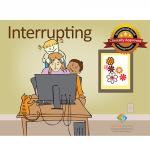Blog Categories
- ADHD
- Applied Behavior Analysis
- Autism Awareness
- Autism Service Providers
- Case Studies
- Dignosis
- Classroom Management
- Credentials
- Ethics
- Family Matters
- FAQs About LIVE Events
- Financial Planning
- Holiday Planning
- IEP's
- Panelists
- Private Equity in Autism & ABA Industry
- Psychopharmacology
- Sensory Processing Disorder
- Speech and Communication
- Subject Matter Experts
- Summer Planning
- Transition Planning
Purge the Urge: Starting the Puberty Talk With Your Special Needs Child
While attending UD she worked as an ABA therapist on a home team. She then went on to earn her Master’s Degree in Social Work from Case Western Reserve University with a focus in Children, Youth, and Families.
Throughout her academic and professional career she has focused in the areas of adoption, domestic violence, teen crisis intervention, and autism. She joined Step By Step Academy in January 2010 and is excited about being able to combine her interests of Social Work and autism. She is currently working on various projects about autism and puberty, in which she hopes to make parents more comfortable about addressing these needs with their children. Additionally she is working with various consumers doing individual and group counseling sessions with focus on gaining social skills and being able to identify and appropriately manage feelings and emotions.
Purge the Urge: Starting the Puberty Talk With Your Special Needs Child
All parents, whether they have a typically developing or special needs teen dread “the talk.” Increase in sweat glands, change in voice, and feeling uncomfortable in your own skin may be some of the similarities both you and your child have during this talk. However, the biggest obstacle is getting up the courage to start the conversation, so let’s get the talk started.
When should it happen?
While special needs children may not be at the same cognitive level as their typical peers, physically and emotionally, puberty doesn’t wait. The most important thing when looking at when you should start talking to your child about puberty is identifying if they will be able to cognitively understand the information you are giving them. A good way to measure this is to look at the individual’s capacity to make decisions. If they are able to make their own simple decisions, communicate in an effective way, and have a stable support system, they should be able to understand and use the information given to them.
Talking about puberty should happen as early as possible, beginning as early as when you take your child to see their pediatrician for check-ups. Being able to have a pediatrician examine the body and explain to the child what they are doing will set them up for success in their future. The key is to have the child learn early that their body is constantly changing and how they can best prepare for these changes. Most children will begin the actual process of puberty between the ages of 10 and 13.
What should it look like
Discussions should be:
– Concrete
– Direct but comfortable
– Straight-forward
– Avoid using ambiguous terms
– Do not give too much information at once
– Be repetitive
– Repeat the same things over and over and use them in an on-going way
Who should be a part of it?
When talking to your child about the changes their body is going through, it is important to include everyone that is active in the child’s life as a supportive part of this process. The more people that are able to help the child understand what their body is going through and how to take care of it, the more support they (and you!) will have. It is also an effective way of making sure everyone in both you and your child’s life is on the same page with your “puberty plan.” You can also use the various people in your child’s life to explain different types of relationships (friendship, romantic, and family) and what is appropriate in each of these relationships.
What to remember?
Lastly, there are 5 simple steps to remember when talking about puberty:
1. Provide correct information
2. Develop personal values
3. Develop social skills
4. Increase the ability to make positive decisions
5. It is important that you set your child up for success, so start everything with baby steps!
RECOMMENDED PRODUCTS
Adolescence and Transition Bundle
Interrupting Social Story Curriculum








